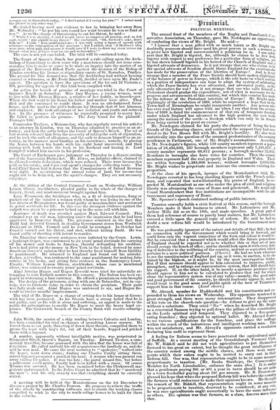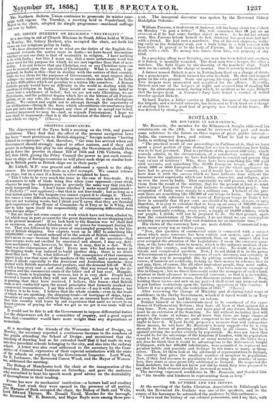rouilitial.
POLITICAL MEETINGS.
The annual feast of the members of the Rugby and Dunchurch Con aervative Association, on Thursday, gave Mr. Newdegate an opportunit; of combating the views of Mr. Bright. He said- " I lament that a man gifted with so much talent as Mr. Bright doubtedly possesses should have used his great were in such a manners; to prove bow bigoted and narrowminded a politician he is. I can safely aver that Mr. Bright is bigoted, for, although he claims to be free from bigotry with respect to any preference for a particular form of religion, yet he has shown himself bigoted in his hatred of the Church of England alien bigoted advocate of democracy. Is it not strange that one who claims to be the special advocate of freedom should blame England for the exertions she has made for the preservation of the liberties of Europe ? And is it not strange that a member of the Peace Society should have spoken slightingly of the balance of power in Europe, which is the sole basis on which natiois in a position of independence can hope to adopt the system of arbitration which the Peace Society has ever advocated, and advocated justly, as the only alternative for war ? Is it not strange that one who calls himself a Protestant should grudge the expenditure, not of what is necessary for the progress and advancement of this country, but which this country has made for the defence of the Protestant interests of Europe ? Mr. Bright spoke slightinglv of the revolution of 1688, while he expressed a hope that in the Town-hall of Birmingham he might inaugurate another. Any person who has ever read history will agree with me when I say that from the revolu- tion of 1688 -is dated the commencement of that era of temperate freedom under which England has advanced to the high position site now holds among the nations of the earth—a freedom which can only be in danger from being carried to too great an excess."
Mr. Newdegate claimed for his party the character of being the best friends of the labouring classes, and contrasted the support they had ren- dered to the Ten Hours Bill with Mr. Bright's hostility. Ho also went statistically into the question of the assumed predominance of the country gentlemen in Parliament, one of Mr. Bright's assumptions. According to Mr. Newdegate's figures, while 159 county members represent a popu. lotion of 10,495,930, 337 borough members represent only 7,431,679: a county member represents 66,012 persons ; a borough member 22,052. Residents in boroughs also have votes for counties. Then the county members represent half the real property in England and Wales. There are within boroughs 1,383,000 houses; without boroughs 2,053,908. Mr. Bright wishes to perpetuate and increase the enormous existing dis- proportion.
At the close of his speech, apropos of the Montalembert trial, Mr. Newdegate reverted to his long standing dispute with the French noble- man, and repeated that notwithstanding his praise of England, he re- garded M. Montalernbert as one who under the plea of civil and religious liberty was advancing the cause of Rome and priestcraft. He would tell Count Montalembert that free institutions are incompatible with the ad- vancement and supremacy of Rome.
Mr. Spooner's speech contained nothing of public interest.
Taunton annually, holds a civic festival at this season, and the borough Members make it their business to attend. Mr. Labouchero and Mr. Arthur Mills did so on the 19th, and made speeches. A great part of them had reference of course to purely local matters, but Mr. Labouchere entered a little upon the general topic of reform. He said he had no doubt a new reform bill would be introduced by the Government next session.
He was profoundly ignorant of the nature and details of that Bill; he had no connection with the Government which would bring it forward, and could form only the vaguest conjecture of the form and colour it would be. But he conceived that a measure which would affect the future generations of England should be regarded not as to whether this or that set of men should occupy the bench of office ; and he should look upon it with every feel- ing of deference to the wellbeing of the country, and not as a question which pertains to a mere political partisan. (Cheers.) He had no wish whatever to see the constituencies of England put up, as it were, to auction, to be ob- tained by the highest, or it might be, by the most unscrupulous bidder. But if that measure should appear to him calculated to improve, purify, strengthen, and to enlarge our representative system, that Bill should have his support. If, on the other hand, it be merely a specious pretence—if it should appear to him not to be calculated to produce that end for which alone the representative system was of any value—namely, the good order and good government of the country, he should fearlessly oppose it, and he would trust to the good sense and public spirit of the men of Taunton to support him in that course. (Loud cheers.) Mr. Akroyd, member for Huddersfield met his constituents and ex- pounded to them his views on Wednesday. His opponents mustered in great strength, and there were many interruptions. They disapproved of his vote on the church-rate question—he refuses to give up the rates without a substitute. They cried "No" when he described Mr. Bright as a renovated Samson trying to pull down the pillars of the constitution on the Lords spiritual and temporal. They objected to a five-pound rating franchise ; they objected to optional ballot. Mr. Akroyd desires to see various qualifications for the franchise, and place the suffrage within the reach of the industrious and intelligent working man. This was not satisfactory, and Mr. Akroyd's opponents carried a resolution declaring him unfit to represent them. A feeling for Reform seems to have penetrated the agricultural mind of Suffolk. At a recent meeting of the Grundisburgh Farmers' Club, Mr. W. Biddell said he did not wish agriculturists to put themselves forward to too great an extent, but he thought the great intelligence of the country rested among the middle classes, and there were many points which their rulers ought to be invited to carry out in their Reform bill. One was, that representation ought to be in some measure proportionate to taxation. [Mr. Banks Stanhope, the Conservative Member for North Lincohushire enforces the same idea.] It is unfair that a gentleman paying 30/. or '401. a year in taxes should be set aside by a town freeholder paying about 101. per annum. Mr. R. Everett ex- pressed his hope that when the proposed Reform bill was before the country the farmers would endeavour to make their opinions known. He thought the remark of Mr. Biddell, that representation ought in some measure to be proportionate to taxation, deserved to be considered; at any rate, he was sure agriculturists ought numerically to have the same influence as others. His opinion was that farmers, as a class, deserve more than that. The Northern Reform Union continuea to prosecute its winter cam- &mt. The inaugural discourse .gn with vigour. On Tuesday, a meeting held in Sunderland, the Godolphin Osborne. qlayor in the chair, adopted its simple programme—manhood suffrage
and vote by ballot.



























 Previous page
Previous page